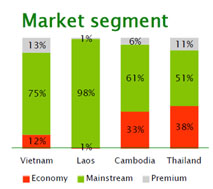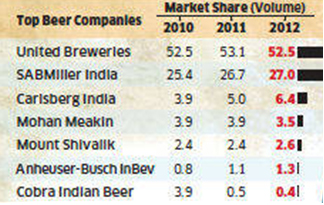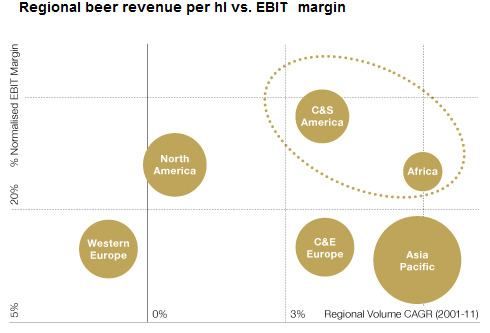It was a good year to marry into the family that owns Australia’s largest locally owned brewer, Coopers Brewery, Australian media joked in January 2014. Its 143 shareholders were showered with AUD 14.7 million (EUR 9.4 million) in dividends in fiscal 2013 (ending June 2013), making it the biggest pay-out in the brewer’s 150 year history.
Some achievement. Vietnam’s beer production grew faster than the country’s economy in 2013. For the full year, GDP was up 5.42 percent, while beer output rose 7.4 percent to 29 million hl, Vietnamese media report.
Thank heaven, Japan’s brewers are finally showing some sense. The nation’s main brewers are trying to increase sales of premium beer over cheap quasi-beer, after years of focusing on “third-segment” beers, known for their low to no malt contents.
Some say that Jakarta, along with its tropical partner, Bali, has the best nightlife anywhere in Southeast Asia, which seems like an incongruous reputation considering that close to 90 percent of Indonesia’s 250 million people are Muslims, making it by far the world’s largest Muslim population – greater than Egypt, Tunisia, Libya, Saudi Arabia and the Persian Gulf countries combined.
Though its patience must have been sorely tested, Heineken has emerged as the largest shareholder in United Breweries (UB), after the Dutch picked up a 1.35 percent stake in India’s largest brewing company through deals on the stock exchange in December 2013.
Danish brewer Carlsberg has increased its stake in China’s Chongqing Brewery to 60 percent, strengthening its foothold in the world’s largest beer market by volume, and hopes to further increase its holding.
A woman at the top of a major beverage company. That’s a new one to us. On 2 December 2013, Coca-Cola Amatil (CCA) announced the appointment of Alison Watkins, 50, currently CEO of GrainCorp, as Group Managing Director. She will join CCA on 3 March 2014, replacing the current and long-serving group MD Terry Davis, who had said earlier this year that he would step down on this date.
The much rumoured sale of San Miguel Brewery will ultimately prove if Japan’s Kirin is really keen on expanding its presence in Asia – or not. Kirin, which holds about 48 percent of San Miguel, has two options: either to join the fray and make an offer to the San Miguel Corporation for its 51 percent stake in the brewer, or do another stint like it did at Singapore’s Fraser & Neave (F&N) last year. Though holding a stake in F&N, it first let the beer division, Asia Pacific Breweries, go to Heineken. Then, in February this year, it sold its own 15 percent stake in the Singapore conglomerate F&N to Thai billionaire Charoen Sirivadhanabhakdi, pocketing about USD 500 million in windfall profits.
India currently represents one of PepsiCo’s largest markets globally. In mid-November, PepsiCo announced plans for the company and its partners to invest 5.5 billion USD in India by 2020 to increase the capabilities in the areas of innovation, manufacturing, infrastructure and agriculture. In addition, the investment is expected to significantly increase production capacity to meet the growing demand for PepsiCo foods and beverages. The company and its partners plan to expand capacity in India to more than double current levels by 2020.
Looks like Lion’s cider portfolio is getting rather bloated. Australia’s number one brewer Lion, owned by Japan’s Kirin, has quite a few cider brands under its belt. Its first cider brand was launched in Australia in 2009: Tooheys Extra Dry 5 Seeds. Its craft trademark, James Squire, has also innovated in cider with the James Squire Orchard Crush range. With the full takeover of the Little Creatures brewers, Lion inherited their Pipsqueak Cider range.




